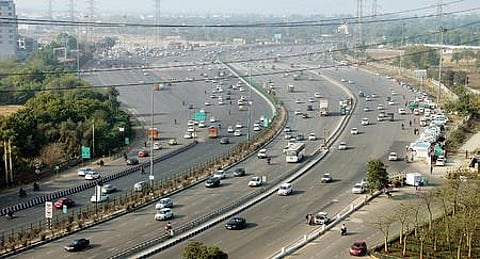

NEW DELHI: Winter is still a few months away, but considering the alarming spike in air pollution post-Diwali every year, the Commission for Air Quality Management for Delhi-NCR has readied its plan to fight the annual battle with toxic air well ahead of time.
The new policy, besides calling for larger interventions, has revamped the Graded Response Action Plan (GRAP) or the emergency action plan introducing some stringent measures, including ban on diesel-run four-wheelers (except for BS-VI compliant vehicles or those providing emergency services) in Delhi and bordering districts as well as on medium and heavy goods vehicles.
The modified GRAP measures also call for a ban on entry of trucks except those carrying essential commodities within the city as well as on Delhi-registered medium and heavy goods vehicles under the ‘severe plus’ (when AQI is more than 450) or emergency category.
So far, GRAP that comes into effect every winter (October 15 – March 31) to deal with different levels of air pollution, measures such as ban on entry of trucks and construction activities used to be implemented in a pre-emptive manner. The new policy provides for these measures to kick-in based on the early warning pollution forecasting system.
According to experts in the nine-member panel, which formulated the new policy to curb pollution, ban on diesel-run four-wheelers under ‘severe plus’ category of pollution will help curb the extremely high pollution , as diesel is a major contributor to PM 2.5.
Pushing for harsher curbs on the entry of heavy vehicles into Delhi’s city limits, the Commission for Air Quality Management (CAQM) for Delhi-NCR and adjoining states has formulated a new policy mandating new measures under the Graded Response Action Plan (GRAP). The ban under the emergency action plan will likely include diesel-run four-wheeled vehicles (LMVs), Delhi-registered diesel-run medium and heavy goods vehicles within city limits when air quality is in ‘severe plus’ or ‘emergency’ category.
However, the plan mulls excluding BS-VI complaint vehicles or those providing emergency services.
So far entry of trucks (except those carrying essential commodities) used to be restricted under the emergency action suggested under GRAP, which remains on the list of banned activities even now. The other measures include shutting down of schools, colleges and educational institutions, encouraging workplaces to have 50% work from home (WFH) and ban on construction and demolition projects, which have been implemented over the past years as well.
The GRAP was first notified in 2017 by the Central Pollution Control Board (CPCB) to deal with different levels of pollution mainly during the winters when Delhi-NCR sees major smog episodes. The measures under the emergency action plan every year kick-in from October 15 and remain in place till March 31 depending on the categories of pollution during this time.
Instead of previously existing five-six categories based on the levels of PM 2.5 and PM 10 --- the most prominent pollutants in the region – newly-modified GRAP now has four major categories of adverse pollution levels based on the air quality index (AQI) instead. These categories are – Stage-I, poor (201-300); Stage II, very poor (301-400); Stage III, severe (401-450); and Stage IV, severe plus or emergency (AQI>450).
According to experts in the nine-member panel that have helped formulate the policy, the key regulations under the severe plus, severe and very poor stages will be invoked at least three days in advance of pollution predicted to reach that category based on the early warning pollution forecasting system developed by the Indian Institute of Tropical Meteorology, Pune.
The GRAP has been modified to make emergency action more preventive than reactive, said experts.
“The measures under GRAP have been revamped given the early warning system with the idea of cutting down on pollution levels before they go too high. Restricting the entry of diesel-run four-wheelers, trucks and medium and heavy goods vehicles under severe plus category will help in a major reduction in vehicular emissions which are the biggest contributor to PM 2.5 levels,” said Anumita Roychowdhury, executive director, Centre for Science and Environment (CSE) and a member of the panel.
The CAQM had set up a nine-member panel to help formulate a policy that offers a permanent solution to the problem of air pollution in the region, which sees extremely high levels of pollution during winter months, in particular during November-December.
ACTION SUGGESTED UNDER STAGES II, III & IV
Severe plus
Stop entry of truck traffic into Delhi (except those carrying essential commodities); ban on plying of Delhi registered diesel-run medium and heavy goods vehicles (except those carrying essential commodities); ban on plying of four-wheeler LMVs in Delhi and NCR districts bordering Delhi (except for BS-VI compliant vehicles and those carrying essentials); state governments to decide on allowing 50% staff strength to work from home (WFH); state governments may consider emergency measures like closure of schools/colleges/ educational institutions, plying of vehicles on odd-even basis; ban on industries in NCR operating on fuels other than PNG; ban on C&D activities in linear public projects such as highways, roads, flyovers, over bridges
Severe
State governments in Delhi-NCR may impose restrictions on BS-III petrol and BS-IV diesel LMVs (four-wheeled vehicles); ban on construction and demolition activities across Delhi-NCR (except emergent projects); regulate operation of industries in NCR not operating on PNG/clean fuels; shutting down of brick kilns, hot mix plants etc not operating on clean fuels; ban on mining activities in NCR
Very poor
Ban on diesel generator (DG) sets except for emergency services, ban on coal and firewood used in open eateries/restaurants across Delhi and adjoining NCR cities
NEW MEASURES UNDER GRADED RESPONSE ACTION PLAN (GRAP)
GRAP now has four categories of adverse air quality based on air quality index (AQI)
Stage-I poor (201-300);
Stage-II very poor (301-400)
Stage-III severe (401-450)
Stage-IV severe plus (AQI>450)
Action suggested under stages II, III and IV to be invoked three days in advance based on early warning pollution forecasting system